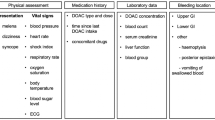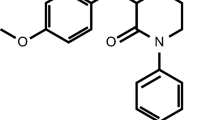Summary
To evaluate the safety and efficacy of tirofiban, a specific inhibitor of the platelet glycoprotein llb/llla receptor, in the treatment of unstable angina and myocardial infarction without persistent ST elevation (acute coronary syndrome, ACS), a total of 200 patients were randomly assigned to a heparin group and a tirofiban+heparin group on double-blind basis and the treatment effects of the two protocols on ACS were compared when the patients of both groups were taking aspirin at the same time. The composite primary end-point events consisted of death, myocardial infarction, or refractory ischemia. Our results showed that the frequency of the composite primary end point events in 30 days was lower in tirofiban+heparin group as compared with that of heparin group (13.9% vs 29.3 %, P=0.010). The rates of the other composite end point events in the tirofiban+heparin group were also lower than those in the heparin group in 4.5 days and in 30 days. Bleeding complication occurred in 7.0% of the patients receiving heparin alone and in 12.7% of the patients receiving tirofiban and heparin in combination (P=0.1717). The study showed that the incidence of ischemic events in patients with ACS receiving tirofiban+heparin was lower when compared with that of patients who received only heparin and aspirin, suggesting that tirofiban might be of special value in the treatment of ACS.
Similar content being viewed by others
References
Stone G W, Moliterno D J, Bertrand M et al. Impact of clinical syndrome acuity on the differential response to 2 glycoprotein llb/llla inhibitors in patients undergoing coronary stenting: The TARGET Trial. Circulation, 2002;105(20):2347–2354
Crouch M A, Nappi J M, Cheang K I. Glycoprotein llb/llla receptor inhibitors in percutaneous coronary intervention and acute coronary syndrome. Ann Pharmacother, 2003,37:860–875
Kim J H, Jeong M H, Rhew J Y et al. Long-term clinical outcomes of platelet glycoprotein llb/llla inhibitor combined with low molecular weight heparin in patients with acute coronary syndrome. Circ J, 2005,69(2):159–164
The RESTORE investigators. Effects of platelet glycoprotein llb/llla blockade with tirofiban on adverse cardiac events in patients with unstable angina or acute myocardial infarction undergoing coronary angioplasty. Circulation, 1997;96(5):1445–1453
The PRISM-PLUS Study Investigators. Inhibition of the platelet glycoprotein llb/llla receptor with tirofiban in unstable angina and non-Q-wave myocardial infarction. N Engl J Med, 1998, 338(21):1488–1497
Boersma E, Harrington R A, Moliterno D J et al. Platelet glycoprotein llb/llla inhibitors in acute coronary syndromes: a meta-analysis of all major randomised clinical trials. Lancet, 2002, 359(19):189–198
Tcheng J E, Ellis S E, George B S et al. Pharmacodynam-ics of chimeric glycoprotein llb/llla integrin antiplatelet anti-body Fab 7E3 in high-risk coronary angioplasty. Circulation, 1994;90(4):1757–1764
Author information
Authors and Affiliations
Additional information
for the Tirofiban Clinical Trial Task Group in China The investigators and hospitals participating in the “Tirofiban Clinical Trial Task Group in China” are listed in the appendix.
Rights and permissions
About this article
Cite this article
Song, Y. Evaluation on the safety and efficacy of tirofiban in the treatment of acute coronary syndrome. J. Huazhong Univ. Sc. Technol. 27, 142–144 (2007). https://doi.org/10.1007/s11596-007-0208-9
Received:
Issue Date:
DOI: https://doi.org/10.1007/s11596-007-0208-9




